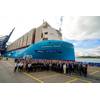Running on Hydrogen – Can it Work?
Hydrogen as fuel was in the spotlight during the last two weeks. The Senate's Energy and Natural Resources Committee held a hearing on February 10 looking at H challenges in the transportation, utility, industrial, commercial, and residential sectors.
A week later, the US House Committee on Science, Space, & Technology held a hearing titled "H2Success: Research and Development to Advance a Clean Hydrogen Future."
Also, of note, the US Department of Energy published two hydrogen RFIs - "requests for information." One on "Clean Hydrogen Manufacturing, Recycling, and Electrolysis." The second on establishing “Clean Hydrogen Hubs.” The recent infrastructure bill provides $8 billion for hydrogen work. ("Clean" is used deliberately to reference H that is de-linked from sources or processes that can cause greenhouse gases.)
Hydrogen, of course, is one alternative fuel mentioned for marine applications, either directly or as an element within the production of ammonia as fuel.
DOE’s outreach has two broad parts:
One, hydrogen manufacturing and recycling research, development, and demonstration (RD&D). Electrolysis is given a high priority, particularly research to reduce capital costs. DOE seeks comments on increasing the applicability of H as a widely used fuel.
Second, DOE is tasked with establishing "Regional Clean Hydrogen Hubs." These Hubs will aid with research and demonstrate production, processing, delivery, storage, and end-use of hydrogen, leading to a national clean hydrogen network to facilitate a clean hydrogen economy.
During the Senate hearing Sen. Lisa Murkowski (AK) asked specifically about H and maritime uses. She said Alaska's commercial fishing industry "wants to decarbonize fishing" and is interested in alternative fuels. She was told that, yes, work on maritime applications is ongoing and will be part of DOE's upcoming research. And a H demonstration is planned for a ferry, although that work is in California, not Alaska.
DOE's comment period ends March 29.















